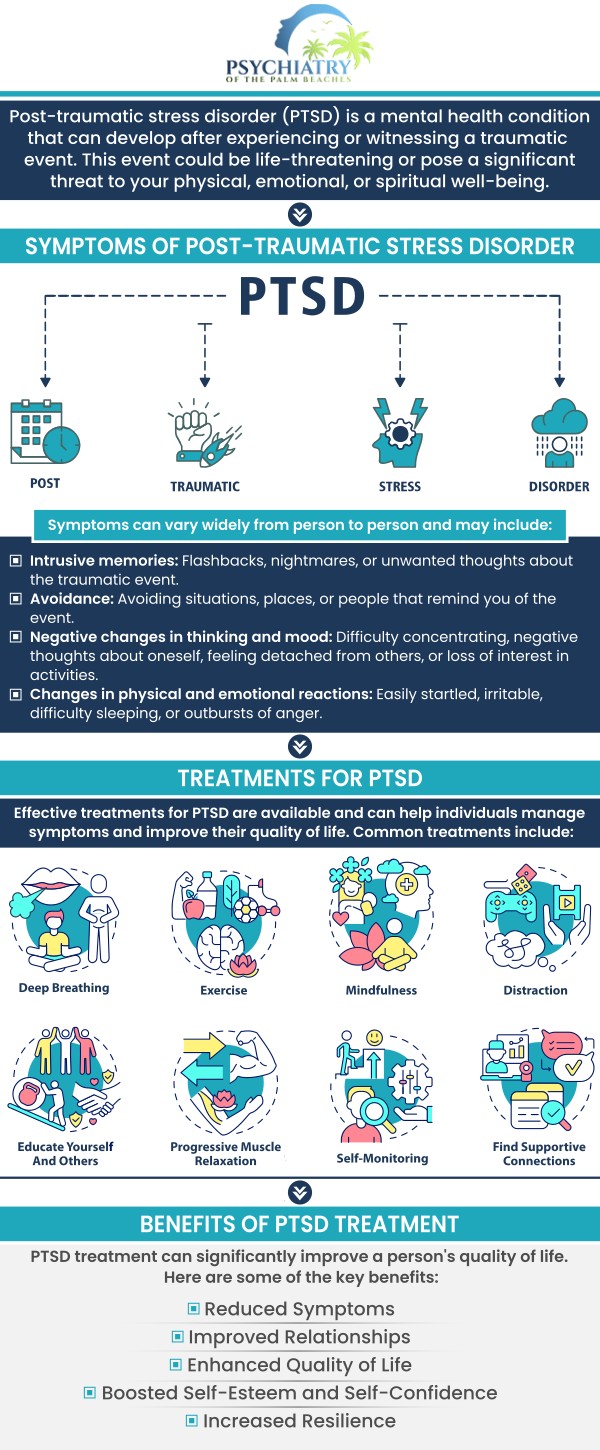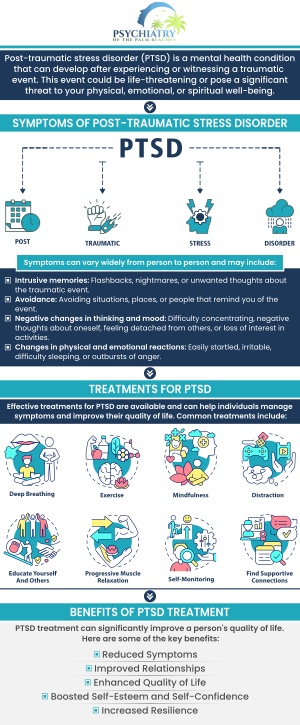PTSD Treatment Clinic in Jupiter, FL
PTSD treatment at Psychiatry of the Palm Beaches focuses on personalized care to help individuals heal from trauma. Dr. David Husted provides compassionate therapy and support for managing symptoms effectively. Trust our team to guide you toward lasting recovery and emotional well-being. For more information, contact us today or book an appointment online. We are conveniently located at 3893 Military Trail Suite 3 Jupiter, FL 33458.


Table of Contents:
Can nightmares be a sign that I might have PTSD?
What physical symptoms suggest that I might have PTSD?
Can PTSD symptoms develop months after a traumatic event?
Can I self-diagnose if I think I have PTSD?
Post-traumatic stress disorder (PTSD) is a type of mental health condition that can develop in the aftermath of a traumatic event. Its presentation is varied, and it may not appear in ways that are immediately connected to the original event. Many individuals with PTSD experience symptoms such as sleep disturbances, sudden anger, and a general sense of emotional disconnection without realizing that their body and mind are still responding to a past experience. These symptoms can adversely interfere with day-to-day life, relationships, and much more. The specialists at Psychiatry of the Palm Beaches provide an evaluation that considers the different ways that PTSD can appear, especially when the symptoms have gone untreated for long periods of time. The goal is to build specialized treatment around the patient’s experience so that treatment is both respectful and effective.
Recurrent nightmares are commonly one of the more recognizable symptoms of PTSD and can often involve a reliving of the original trauma, either directly or in different forms. Some individuals find themselves waking up in a panic or soaked in sweat, even when they cannot recall what they were dreaming about. These episodes tend to disrupt sleep and leave the body in a state of distress that infringes upon sleep quality.
Nightmares related to trauma are different from an occasional bad dream. Instead, they may follow a pattern or similar themes. The individual might find it difficult to return to sleep afterward or experience dread in anticipation of going to bed at all. The nervous system remains on high alert even during rest, which makes it difficult to recover and heal over time. When providers at Psychiatry of the Palm Beaches consider nightmares, they are looking not only at how vivid or frightening the dreams are but also how they tie into the broader considerations regarding the individual’s emotional and physiological response.
PTSD often presents alongside physical symptoms that are not always recognized as part of a psychological condition. The body may hold tension in a way that leads to chronic headaches, gastrointestinal issues, or muscle pain. The heart rate may elevate during periods of stress, even when there is no clear threat in the environment. Some individuals experience dizziness, nausea, or episodes that resemble panic attacks without knowing what is triggering them.
These symptoms might be a sign that the body has adapted to remain in a state of readiness, as if danger could return at any moment. This hyperarousal can wear on the system over time. It may also lead to fatigue, restlessness, and sleep disruption, making recovery feel even farther away. When these physical responses persist, they often create a situation wherein both the body and mind reinforce one another’s distress.
Providers at Psychiatry of the Palm Beaches approach these symptoms as part of the overall presentation. Once the source of the hyperarousal is addressed through therapy or other interventions, the body often begins to recover along with the mind. But the process starts with identifying the symptoms and understanding how they relate to the patient’s unique circumstances and experience.
PTSD does not always emerge in the immediate aftermath of a traumatic event. Some individuals may notice symptoms appear weeks or months later. This delay may occur for a variety of reasons. The individual might suppress the experience as a way to keep functioning, or the environment might not feel safe enough to fully process what happened until later.
The condition sometimes develops gradually, as the nervous system struggles to manage the trauma. Nightmares, irritability, or emotional detachment may come on slowly and not be immediately linked back to the event. For some, it is only once things calm down following the immediate aftermath that the symptoms start to surface. When providers at Psychiatry of the Palm Beaches assess for PTSD, they account for this kind of delayed onset. Just because time has passed since the event does not mean the trauma has resolved. In many cases, the symptoms become harder to recognize the farther they are from the source, which makes professional evaluation and customized treatment planning even more important. Identifying the connection between potentially traumatic events and present symptoms allows treatment to holistically address patient concerns.
Many individuals may understand that something is wrong, particularly following a traumatic event, before they receive a PTSD diagnosis. They may notice associated symptoms such as emotional detachment, constant unease, or sudden changes in how they respond to everyday situations. While being aware of these symptoms is beneficial, it is important to consult with a trained specialist for a proper diagnosis and treatment implementation. PTSD can overlap with other mental health diagnoses, including depression, generalized anxiety, or complex trauma. Without a structured evaluation, the individual may mislabel what they are experiencing or overlook certain symptoms entirely.
The specialists at Psychiatry of the Palm Beaches provide evaluations that help clarify whether PTSD is present and how it may be influencing the patient’s overall functioning. This allows treatment to be built around a foundation for care that is targeted and responsive, which increases the likelihood of long-term progress.
Psychiatry of the Palm Beaches provides post-traumatic stress disorder (PTSD) treatment. For more information, contact us today or book an appointment online. We are conveniently located at 3893 Military Trail Suite 3 Jupiter, FL 33458. We serve patients from Jupiter FL, North Palm Beach FL, Riviera Beach FL, West Palm Beach FL, and surrounding areas.
Check Out Our 5 Star Reviews



Additional Services You May Need
▸ Mental Wellness
▸ Relationship Coaching
▸ Depression and Mood Disorders
▸ Women’s Health
▸ Panic Disorder
▸ Medications Management
▸ Men’s Health
▸ Individual Psychotherapy
▸ Bipolar
▸ ADHD
▸ Geriatric Mental Health
▸ Couple’s Counseling
▸ Obsessive Compulsive Disorder
▸ Social Phobia Treatment
▸ Eating Disorders
▸ Post Traumatic Stress Disorder
▸ Psychotic Disorders



